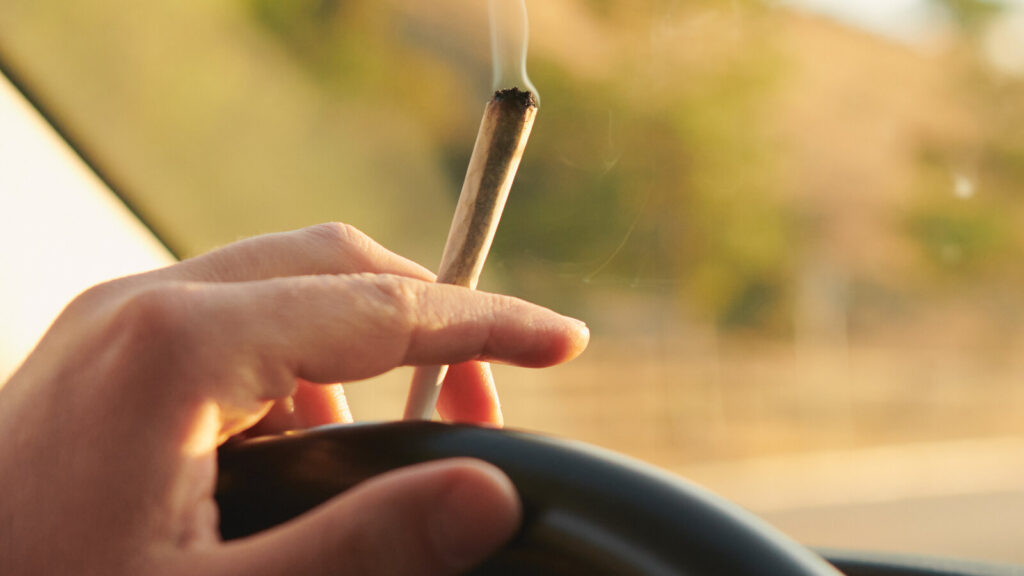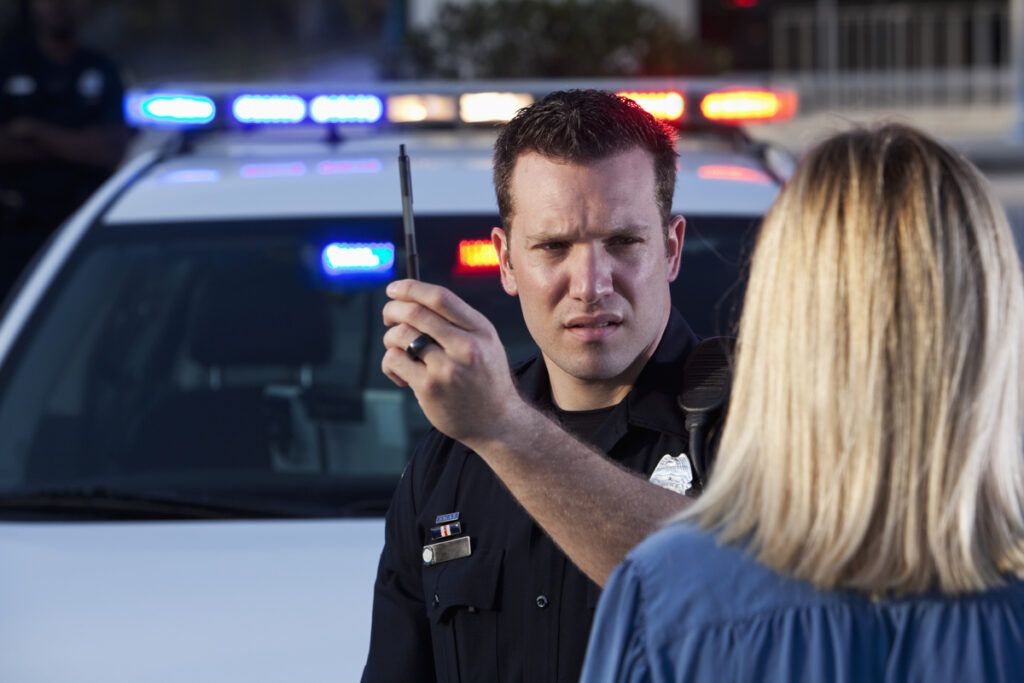Like driving with alcohol, driving with marijuana is illegal under certain conditions in Massachusetts. However, the laws are complex. Learn what to do if you’re pulled over with marijuana and how to protect your rights.
Is It Illegal To Drive With Marijuana In Your Car In Massachusetts?
Yes, it is illegal if it violates open container laws or you’re using it while driving. Adult-use marijuana is legal in Massachusetts for individuals over 21 years old, but that doesn’t mean you can drive around with an open container of cannabis.
According to M.G.L. c. 94G, § 13, marijuana must be stored in a sealed container and kept in the trunk or another area not “readily accessible” from the driver’s seat. If it’s found open or improperly stored, it’s a civil infraction, like having an open beer.
Massachusetts law also limits possession: you can carry up to 1 ounce on your person and up to 10 ounces at home. While transporting, anything over 1 ounce must be secured in the trunk. Using marijuana while driving is illegal regardless of the amount.
The Massachusetts Cannabis Control Commission emphasizes that operating a vehicle under the influence of marijuana is treated the same as drunk driving. Local enforcement agencies like the Worcester Police Department are closely monitoring compliance, especially near colleges and nightlife areas.
Can Police Search Your Car If They Smell Marijuana?
Yes, because it contributes to probable cause under certain circumstances.
However, the rules have changed post-legalization. Commonwealth v. Cruz (2011) set the standard that just smelling burnt marijuana was not enough for warrantless search of a vehicle. However, since the legalization of adult-use marijuana, courts now weigh probable cause differently.
Under the Fourth Amendment and Article 14 of the Massachusetts Declaration of Rights, searches require either a warrant or probable cause. If the smell of marijuana is combined with other factors (like erratic driving, visible paraphernalia, or contradictory statements) officers may have reasonable suspicion to escalate a stop.
The Massachusetts Appeals Court has clarified that while odor alone may not justify a full vehicle search, it can contribute to the totality of circumstances that support police action.

What Happens If Marijuana Is Found In The Glove Compartment Or Trunk?
If it’s found in the glove box, the officer may consider it “readily accessible”, which can mean stiffer penalties, but keeping it in the trunk is usually acceptable under Massachusetts law.
Under M.G.L. c. 94C § 32C, the location of the marijuana is important. If it’s stored in the glove box or center console, it may be considered constructive possession and violate open container laws. If other indicators are present (like multiple baggies, a scale, or lots of cash) police may infer an intent to distribute, which is a more serious charge under the Controlled Substances Act (CSA).
By contrast, marijuana stored in the trunk is considered lawfully transported. The legal standard here hinges on whether the cannabis is “readily accessible” to the driver or passengers. In Worcester District Court, prosecutors consider how the marijuana was stored and whether other items suggest anything other than personal use.
A simple mistake in storage could lead to stiffer charges.
Do You Have To Admit It’s Marijuana If Asked?
You do not have to admit it, and you’re protected by your right to remain silent under the Fifth Amendment. During a traffic stop, police may ask if a substance is marijuana. You are not legally required to answer. Miranda v. Arizona and the Fifth Amendment’s self-incrimination clause mean you have the right to remain silent.
However, lying to police (for instance, saying it’s oregano when it clearly isn’t) can complicate your case. The best practice is to stay silent without providing false information. If you’re detained, anything you say can be used against you.
A voluntary statement admitting possession can be incriminating, especially in borderline cases. Officers from the Massachusetts State Police and local departments like Worcester’s are trained to look for cues during traffic stops, so being calm, respectful, and legally cautious is your safest approach.
Will You Be Arrested Or Cited For Marijuana In Your Vehicle?
You may be cited or arrested for marijuana in your vehicle depending on the amount, storage method, and whether there are signs of intent to distribute. For less than 1 ounce of properly stored marijuana, you might receive a civil marijuana citation if the container is open or improperly stored.
However, if the marijuana is accessible, appears packaged for sale, or exceeds possession limits, you could face arrest. Booking and arrest procedures are initiated when officers believe a criminal offense has occurred, like distribution or operating under the influence.
A Massachusetts Uniform Citation may be issued for civil violations, while criminal offenses can result in immediate detention. In certain cases, especially those involving trafficking or repeat offenses, your vehicle may be impounded under contraband seizure protocols.
The RMV (Registry of Motor Vehicles) may also become involved if charges affect your license status.

What Should You Do During The Traffic Stop To Protect Yourself Legally?
To protect yourself legally during a marijuana-related traffic stop, remain calm, keep your hands visible, decline consent to search, and avoid incriminating statements. Here’s a quick traffic stop checklist:
- Pull over safely and keep your hands visible.
- Provide license and registration when asked. Do not consent to a vehicle search.
- Politely state that you wish to remain silent.
- Ask if you are free to leave.
Under the Fourth Amendment, you are not required to consent to searches. If the officer proceeds without consent, your lawyer may later file a motion to suppress evidence. The Massachusetts ACLU recommends that you communicate clearly and respectfully and make no sudden movements.
The Worcester Police Department often uses body cam footage, so your behavior during the stop may influence how your case is perceived later.
Should You Contact A Marijuana Defense Lawyer Afterward?
Yes, you should contact a marijuana defense lawyer as soon as possible to protect your rights and avoid escalation. Even minor marijuana violations can have unexpected legal consequences, especially if there are additional charges or prior offenses. A qualified criminal defense attorney can help with motions like suppression, challenge procedural errors, and identify issues like lab testing errors or chain of custody problems involving evidence.
If a drug recognition expert (DRE) evaluated you during the stop, your attorney can scrutinize their findings. Consulting a lawyer early gives you a better chance at dismissal, reduced charges, or participation in diversion programs like Massachusetts Drug Court.
Can Marijuana Charges Affect Your Driver’s License?
Yes, marijuana-related convictions in Massachusetts can lead to license suspension, especially for OUI charges or commercial drivers. The RMV (Registry of Motor Vehicles) can suspend your license if you’re convicted of marijuana-impaired driving or related criminal offenses.
- For standard licenses, a first offense may not always result in suspension, but it’s more likely with aggravating factors or repeat violations.
- For those holding a CDL (Commercial Driver’s License), the standards are stricter.
Any marijuana conviction, even off-duty, can mean CDL disqualification. The license suspension period varies, but it usually runs from 60 days to a year, depending on things like your driving history and how severe the charges are.
Marijuana charges can also mean other problems, like increasing your insurance or making it harder to find a job.

How Can A Worcester Marijuana Lawyer Fight The Charges?
A Worcester marijuana lawyer can fight charges by challenging the search, proving lack of probable cause, or disputing the substance’s identification. Defense strategies often begin with a suppression hearing to exclude unlawfully obtained evidence.
- If the stop lacked legal justification, or the search exceeded permissible scope, your lawyer can argue for a motion to dismiss.
- Substance identity can be challenged through forensic drug testing, especially if there were errors in collection or handling.
- The chain of custody is a common point of contention, and any misstep could weaken the prosecution’s case.
A skilled defense lawyer in Worcester understands local enforcement practices, court tendencies, and the nuances of MA drug court programs that may be available to eligible defendants.
FAQ
Is weed legal in Massachusetts?
Yes, weed is legal in Massachusetts for adults over 21 for both recreational and medical use, with specific possession and use limitations.
Can I drive with edibles or vape pens?
Yes, you can drive with edibles or vape pens if they are sealed and stored out of reach but using them while driving is illegal.
Do I need a medical card to avoid arrest?
No, a medical card is not required for adults over 21, but those under 21 need a card for legal possession.
Can the case be dismissed if it’s under an ounce?
Yes, cases involving less than an ounce may be dismissed, especially if the marijuana was properly stored and there are no aggravating factors.
Yes, non-residents must get a temporary LTC to carry firearms in Massachusetts. This license is issued by the Massachusetts State Police and requires an application process. Federal laws may allow for interstate travel with firearms, but it’s crucial to comply with Massachusetts state laws to avoid legal issues.
If you’ve been stopped with marijuana in your vehicle in Worcester or surrounding towns like Auburn, Shrewsbury, Grafton, or Millbury, make sure you understand your rights and obligations. When in doubt, speak with a qualified Massachusetts criminal defense attorney to protect your record and your future.
